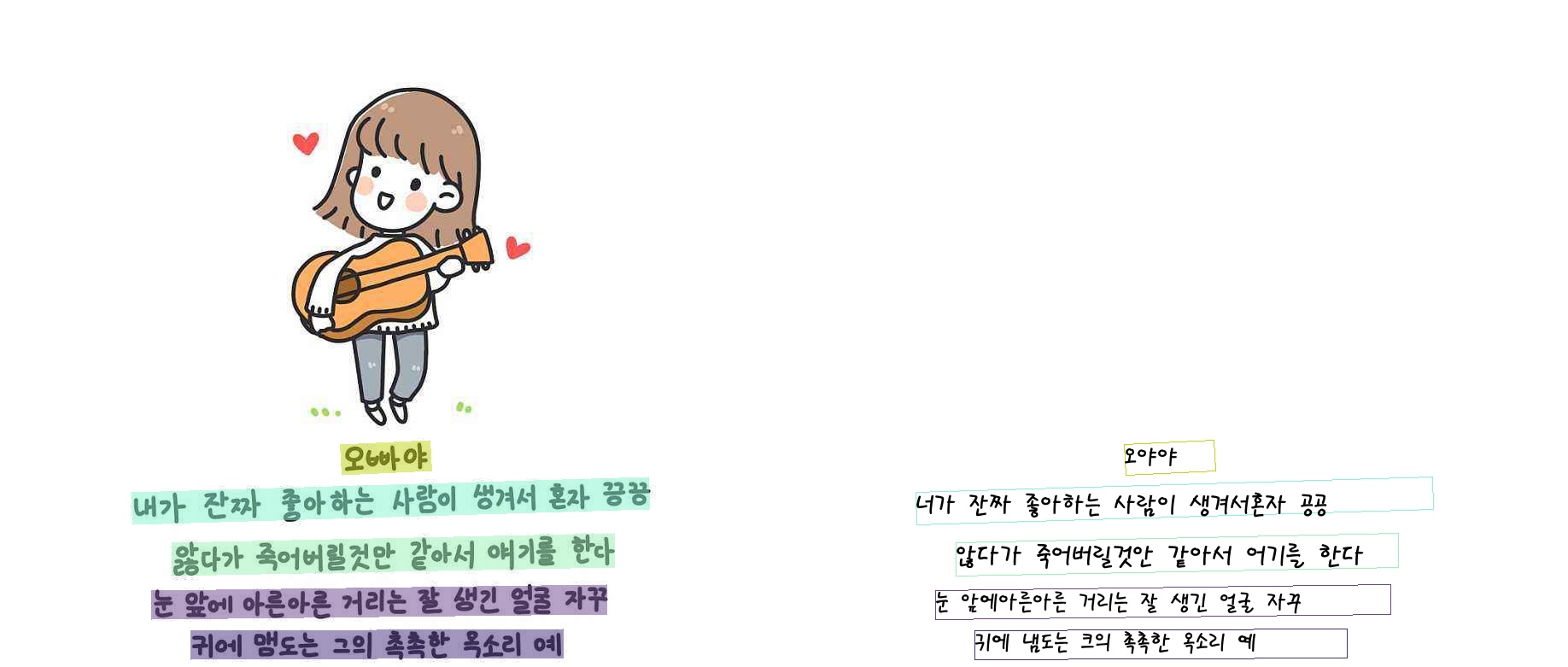Recent Update
- 2022.5.8 update the
PP-OCRv3version of the multi-language detection and recognition model, and the average recognition accuracy has increased by more than 5%. - 2021.4.9 supports the detection and recognition of 80 languages
- 2021.4.9 supports lightweight high-precision English model detection and recognition
PaddleOCR aims to create a rich, leading, and practical OCR tool library, which not only provides Chinese and English models in general scenarios, but also provides models specifically trained in English scenarios. And multilingual models covering 80 languages.
Among them, the English model supports the detection and recognition of uppercase and lowercase letters and common punctuation, and the recognition of space characters is optimized:
The multilingual models cover Latin, Arabic, Traditional Chinese, Korean, Japanese, etc.:
This document will briefly introduce how to use the multilingual model.
# cpu
pip install paddlepaddle
# gpu
pip install paddlepaddle-gpu
pip install
pip install paddleocr
Build and install locally
python3 -m build
pip3 install dist/paddleocr-x.x.x-py3-none-any.whl # x.x.x is the version number of paddleocr
View help information
paddleocr -h
- Whole image prediction (detection + recognition)
PaddleOCR currently supports 80 languages, which can be specified by the --lang parameter. The supported languages are listed in the table.
paddleocr --image_dir doc/imgs_en/254.jpg --lang=enThe result is a list. Each item contains a text box, text and recognition confidence
[('PHO CAPITAL', 0.95723116), [[66.0, 50.0], [327.0, 44.0], [327.0, 76.0], [67.0, 82.0]]]
[('107 State Street', 0.96311164), [[72.0, 90.0], [451.0, 84.0], [452.0, 116.0], [73.0, 121.0]]]
[('Montpelier Vermont', 0.97389287), [[69.0, 132.0], [501.0, 126.0], [501.0, 158.0], [70.0, 164.0]]]
[('8022256183', 0.99810505), [[71.0, 175.0], [363.0, 170.0], [364.0, 202.0], [72.0, 207.0]]]
[('REG 07-24-201706:59 PM', 0.93537045), [[73.0, 299.0], [653.0, 281.0], [654.0, 318.0], [74.0, 336.0]]]
[('045555', 0.99346405), [[509.0, 331.0], [651.0, 325.0], [652.0, 356.0], [511.0, 362.0]]]
[('CT1', 0.9988654), [[535.0, 367.0], [654.0, 367.0], [654.0, 406.0], [535.0, 406.0]]]
......
- Recognition
paddleocr --image_dir doc/imgs_words_en/word_308.png --det false --lang=enThe result is a 2-tuple, which contains the recognition result and recognition confidence
(0.99879867, 'LITTLE')
- Detection
paddleocr --image_dir PaddleOCR/doc/imgs/11.jpg --rec false
The result is a list. Each item represents the coordinates of a text box.
[[26.0, 457.0], [137.0, 457.0], [137.0, 477.0], [26.0, 477.0]]
[[25.0, 425.0], [372.0, 425.0], [372.0, 448.0], [25.0, 448.0]]
[[128.0, 397.0], [273.0, 397.0], [273.0, 414.0], [128.0, 414.0]]
......
PPOCR is able to run with Python scripts for easy integration with your own code:
- Whole image prediction (detection + recognition)
from paddleocr import PaddleOCR, draw_ocr
# Also switch the language by modifying the lang parameter
ocr = PaddleOCR(lang="korean") # The model file will be downloaded automatically when executed for the first time
img_path ='doc/imgs/korean_1.jpg'
result = ocr.ocr(img_path)
# Recognition and detection can be performed separately through parameter control
# result = ocr.ocr(img_path, det=False) Only perform recognition
# result = ocr.ocr(img_path, rec=False) Only perform detection
# Print detection frame and recognition result
for line in result:
print(line)
# Visualization
from PIL import Image
image = Image.open(img_path).convert('RGB')
boxes = [line[0] for line in result]
txts = [line[1][0] for line in result]
scores = [line[1][1] for line in result]
im_show = draw_ocr(image, boxes, txts, scores, font_path='/path/to/PaddleOCR/doc/fonts/korean.ttf')
im_show = Image.fromarray(im_show)
im_show.save('result.jpg')
PPOCR also supports direction classification. For more detailed usage, please refer to: whl package instructions.
PPOCR supports using your own data for custom training or fine-tune, where the recognition model can refer to French configuration file Modify the training data path, dictionary and other parameters.
For specific data preparation and training process, please refer to: Text Detection, Text Recognition, more functions such as predictive deployment, For functions such as data annotation, you can read the complete Document Tutorial.
In addition to installing the whl package for quick forecasting, PPOCR also provides a variety of forecasting deployment methods. If necessary, you can read related documents:
| Language | Abbreviation | Language | Abbreviation | |
|---|---|---|---|---|
| Chinese & English | ch | Arabic | ar | |
| English | en | Hindi | hi | |
| French | fr | Uyghur | ug | |
| German | german | Persian | fa | |
| Japan | japan | Urdu | ur | |
| Korean | korean | Serbian(latin) | rs_latin | |
| Chinese Traditional | chinese_cht | Occitan | oc | |
| Italian | it | Marathi | mr | |
| Spanish | es | Nepali | ne | |
| Portuguese | pt | Serbian(cyrillic) | rs_cyrillic | |
| Russia | ru | Bulgarian | bg | |
| Ukranian | uk | Estonian | et | |
| Belarusian | be | Irish | ga | |
| Telugu | te | Croatian | hr | |
| Saudi Arabia | sa | Hungarian | hu | |
| Tamil | ta | Indonesian | id | |
| Afrikaans | af | Icelandic | is | |
| Azerbaijani | az | Kurdish | ku | |
| Bosnian | bs | Lithuanian | lt | |
| Czech | cs | Latvian | lv | |
| Welsh | cy | Maori | mi | |
| Danish | da | Malay | ms | |
| Maltese | mt | Adyghe | ady | |
| Dutch | nl | Kabardian | kbd | |
| Norwegian | no | Avar | ava | |
| Polish | pl | Dargwa | dar | |
| Romanian | ro | Ingush | inh | |
| Slovak | sk | Lak | lbe | |
| Slovenian | sl | Lezghian | lez | |
| Albanian | sq | Tabassaran | tab | |
| Swedish | sv | Bihari | bh | |
| Swahili | sw | Maithili | mai | |
| Tagalog | tl | Angika | ang | |
| Turkish | tr | Bhojpuri | bho | |
| Uzbek | uz | Magahi | mah | |
| Vietnamese | vi | Nagpur | sck | |
| Mongolian | mn | Newari | new | |
| Abaza | abq | Goan Konkani | gom |








